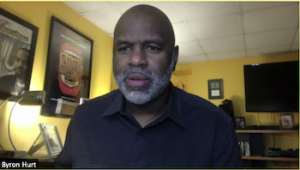 Many boys in our society are conditioned from a young age to be tough, to hide their emotions, and to avoid any appearance of behaving “like a girl,” documentary filmmaker and anti-sexist activist Byron Hurt told student-athletes recently.
Many boys in our society are conditioned from a young age to be tough, to hide their emotions, and to avoid any appearance of behaving “like a girl,” documentary filmmaker and anti-sexist activist Byron Hurt told student-athletes recently.
This mindset favors aggression, prevents boys from connecting with their emotions, and undervalues girls and women, sometimes leading to toxic masculinity and violence, said Hurt, who visited Milton athletes virtually as part of a series of speakers this fall who promote mental fitness.
“I grew up in a culture where you had to perform a certain kind of manhood and masculinity in order to be accepted by other guys and be seen as a ‘real man’” said Hurt. When boys and men feel like they can’t be vulnerable with their emotions, those emotions can be redirected in unhealthy ways: abuse, depression, violence, failed relationships, and out-of-control actions.
Boys hear words like “soft,” “gay,” and “girly” if they don’t meet the expectations of masculinity—and when those words are used as pejoratives it triggers the idea that women and gay men are weak, Hurt said. It also signals to boys that they must harden themselves to avoid any appearance of weakness.
He urged students to intervene when they witness someone using sexist and homophobic language. “It takes strength and courage to stand up and say, ‘That’s not what we do,’” Hurt said.
“This exaggerated sense of manhood is in the air that we breathe,” he said. “If the culture doesn’t give us permission to cry, to be soft, and to express the full range of our emotions beyond anger, there can be some negative consequences.”
Hurt majored in journalism at Northeastern University, where he played quarterback, and envisioned a career in radio and television broadcasting. During his last year, he was introduced to the work of the groundbreaking documentary filmmaker Marlon Riggs, whose films explored issues of race and sexuality.
After graduation, Hurt became involved with Northeastern’s Center for the Study of Sport in Society, working with its Mentors in Violence Prevention program. At the core of his mission was to get boys and men to speak up and stop sexism, gender-based violence, and homophobia. At first, he feared what his male friends would think about him working with these subjects; he’d grown up as a “jock” in a “deeply male culture where ‘locker-room talk’ was the norm.”
Hurt received an Emmy nomination for his television show, Reel Works with Byron Hurt. He made the documentaries Hip Hop: Beyond Beats and Rhymes, which explores violence and sexism in hip hop music, and Soul Food Junkies, which received the Best Documentary award at the American Black Film Festival. His forthcoming documentary, Hazing: How Badly Do You Want In, explores the dangerous culture of hazing.
